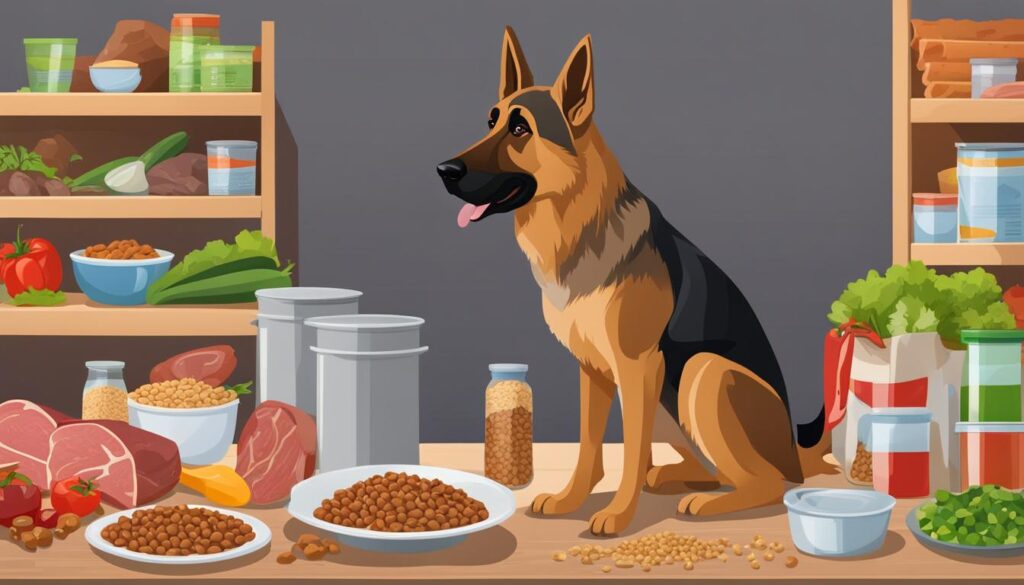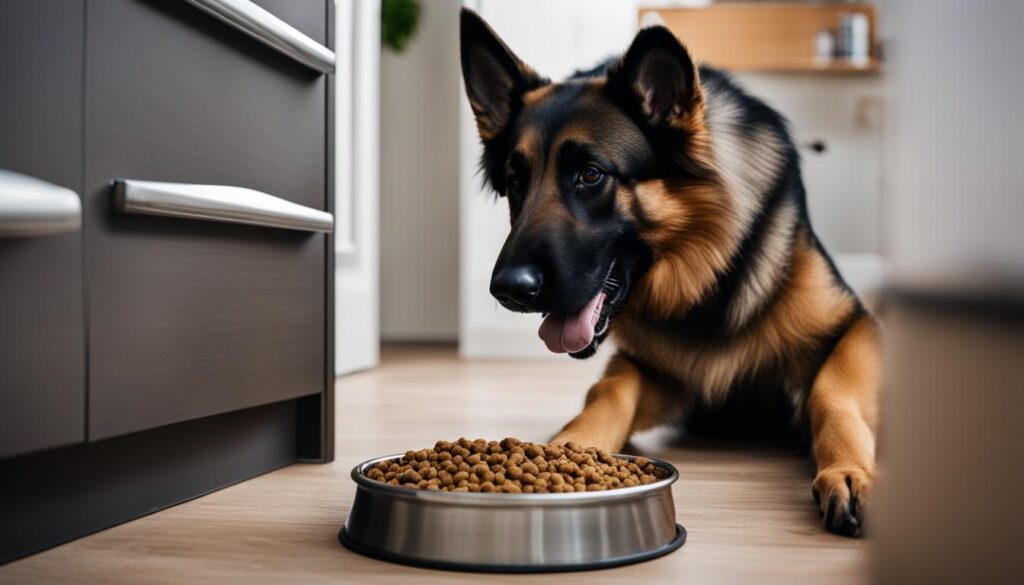If you’re a German Shepherd owner, it’s crucial to ensure your furry friend is eating the appropriate amount of food each day. Feeding your German Shepherd the correct portions is vital for their overall health and well-being. In this section, we will discuss the ideal food portions for your German Shepherd and provide a daily feeding guide tailored to their nutritional needs and calorie intake.
German Shepherds require a balanced diet, and it’s essential to consider their specific feeding needs. Understanding the appropriate meal portions, calorie intake, and overall nutrition requirements can help your dog maintain a healthy eating routine and optimal weight.
Key Takeaways
- Feeding your German Shepherd the appropriate amount of food is essential for their overall health and well-being.
- German Shepherds have specific dietary requirements that need to be met for them to thrive.
- Understanding the recommended food portions, calorie intake, and nutrition requirements can help maintain a healthy eating routine for your German Shepherd.
- Consult with your veterinarian for personalized advice based on your dog’s specific nutritional needs.
Understanding German Shepherd Feeding Requirements
German Shepherds are high-energy dogs that require proper nutrition to maintain their health and wellbeing. As pet owners, it’s our responsibility to ensure they receive optimal care, starting with a well-balanced diet. Let’s take a closer look at their feeding requirements, including their food portions, calorie intake, and nutrition needs.
German Shepherd Food Portions
The amount of food your German Shepherd requires depends on several factors, including age, weight, activity level, and overall health. As a general guideline, most adult German Shepherds require 2-3 cups of dry food per day, split into two meals.
Avoid overfeeding your dog, even if they ask for more. Keep treats to a minimum and compensate for them by reducing the amount of food in their meals.
| Age | Daily Food Intake |
|---|---|
| Puppy (2-4 months) | ¾ to 1½ cups |
| Puppy (4-6 months) | 1 to 2 cups |
| Puppy (6-12 months) | 2 to 3 cups |
German Shepherd Calorie Intake
German Shepherds require a high-calorie diet to support their active lifestyle. An average German Shepherd requires 1,500 to 1,800 calories per day, but this number varies depending on their weight, age, and activity level. Consult with your veterinarian to determine a specific calorie count for your dog.


German Shepherd Nutrition Requirements
German Shepherds require a balanced diet with a variety of proteins, carbohydrates, fats, vitamins, and minerals. Good sources of protein include high-quality meats, such as chicken, turkey, lamb, and beef. Carbohydrates can be found in grains, fruits, and vegetables, such as rice, sweet potatoes, green beans, and carrots. Fats are vital for optimal health and can be found in sources such as fish oil, flaxseed oil, and canola oil.
It’s important to choose a high-quality dog food that meets your German Shepherd’s nutritional requirements. Avoid foods with fillers and chemicals that could be detrimental to your dog’s health.
German Shepherd Healthy Eating Guidelines
Proper feeding habits are key to maintaining your dog’s health. Here are some healthy eating habits to keep in mind:
- Feed your dog at regular intervals
- Provide fresh water at all times
- Avoid feeding your dog table scraps and other human foods
- Do not free-feed your dog, stick to a regular schedule
- Use food puzzles and toys to slow down eating
Conclusion
Feeding your German Shepherd the appropriate amount of food each day is crucial to ensure their overall health and well-being. By following the daily feeding guide and considering their nutritional needs, you can help your German Shepherd maintain a balanced diet and optimal weight.
Remember to monitor their calorie intake, especially if they are less active. It’s also important to consult with your veterinarian for personalized advice based on your dog’s specific needs.
With these healthy eating guidelines in mind, you can provide your German Shepherd with the best meal recommendations and feeding amounts to support their nutrition requirements and maintain their health for years to come.
FAQ
How much food should I feed my German Shepherd daily?
The amount of food your German Shepherd requires will depend on several factors, including their age, weight, activity level, and overall health. As a general guideline, adult German Shepherds usually require between 2 to 3 cups of high-quality dry dog food per day, divided into two meals. Puppies and active or working dogs may need more. It’s best to consult with your veterinarian to determine the appropriate food portions for your specific dog.
What are some meal recommendations for my German Shepherd?
It is recommended to feed your German Shepherd a balanced diet that consists of high-quality dog food formulated for their specific life stage (puppy, adult, or senior). Look for dog food that includes real meat as the first ingredient and is free from artificial additives. Additionally, you can offer occasional healthy treats, such as fruits or vegetables, but be cautious to avoid foods that are toxic to dogs, like chocolate or onions.
How many calories should my German Shepherd consume each day?
The number of calories your German Shepherd needs will vary depending on their age, weight, and activity level. As a rough estimate, adult German Shepherds typically require around 1,500 to 2,500 calories per day. However, it’s important to consult with your veterinarian to determine the precise calorie needs for your individual dog.
What are some diet tips to ensure my German Shepherd eats healthily?
To promote healthy eating habits in your German Shepherd, it’s important to establish a consistent feeding routine. Avoid leaving food out all day, as free-feeding can lead to overeating and weight gain. Additionally, provide fresh water at all times and monitor their food intake to prevent obesity. Regular exercise is also crucial for maintaining a healthy weight and overall well-being.
What are the nutrition requirements for German Shepherds?
German Shepherds require a balanced diet that provides essential nutrients to support their active lifestyle. Look for dog food that contains high-quality protein, healthy fats, and carbohydrates. It should also include vitamins, minerals, and antioxidants. Omega-3 fatty acids, like those found in fish oil, can help promote healthy skin and coat. Consulting with your veterinarian can help ensure you meet your German Shepherd’s specific nutritional needs.
How can I determine the appropriate feeding amounts for my German Shepherd?
Always refer to the feeding guidelines provided on the dog food packaging as a starting point. However, keep in mind that these are general recommendations and may need to be adjusted based on your German Shepherd’s individual needs. Monitor their body condition and weight regularly, and make adjustments to the portions as necessary. Your veterinarian can provide personalized guidance to determine the ideal feeding amounts for your specific dog.
What are some healthy eating guidelines for German Shepherds?
To ensure your German Shepherd maintains a healthy diet, consider the following guidelines: provide a balanced and nutritionally complete dog food, avoid feeding excessive treats or table scraps, monitor their portion sizes, and promote regular exercise. It’s also crucial to be aware of any food allergies or intolerances your dog may have and avoid those ingredients. Seeking advice from your veterinarian can provide you with tailored guidelines based on your German Shepherd’s specific needs.

